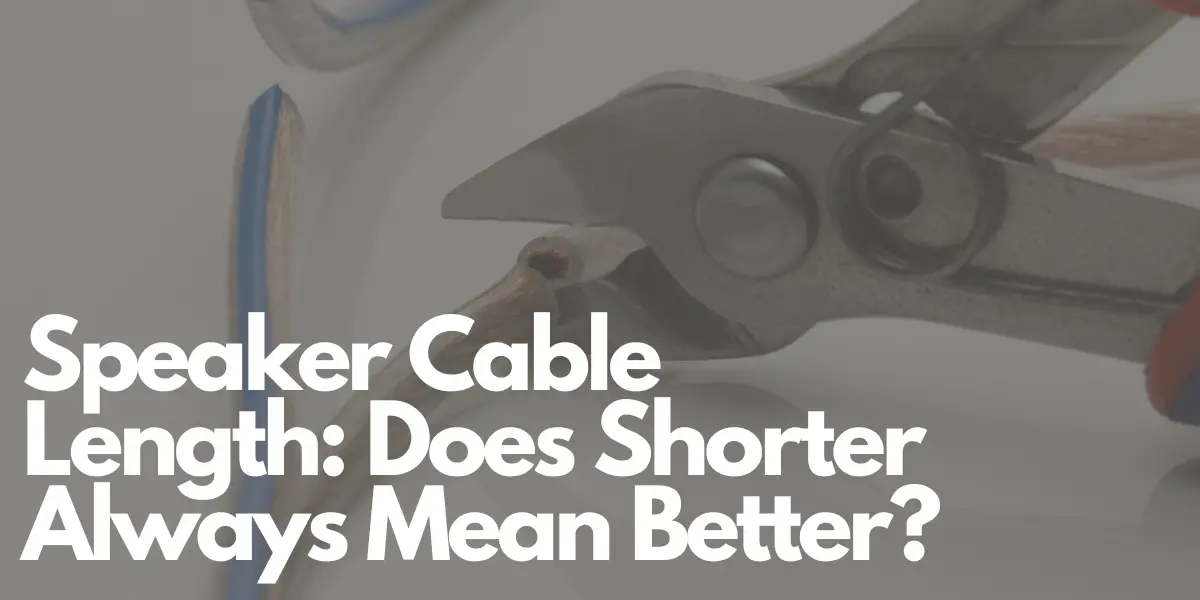In the world of audio, intricate details often become the subject of fervent debate among enthusiasts and professionals alike. One such debate centers around speaker cable length and its potential effect on sound quality. Is shorter always superior, or is this another myth floating in the realm of acoustics?
Dive into our comprehensive examination as we unravel the truth behind the influence of speaker cable length on your auditory experience.
Grasping the Basics of Speaker Cables
Speaker cables, an integral part of any audio setup, come in varying lengths, right from a few inches to extensive measures spanning several feet or meters. An important aspect to consider is the wire gauge, which signifies the thickness of the cable. A smaller gauge number corresponds to a thicker wire.
One might wonder, why does the thickness matter? Primarily because thicker wires tend to provide enhanced conductivity, reducing electrical resistance, which can, in turn, impact the signal’s transmission quality.
How Cable Length Might Affect Audio Quality
The cable length, though often overlooked, can subtly influence the sound quality, contingent on a host of factors:
Electrical Resistance:
With an increase in cable length, the inherent electrical resistance also rises. This added resistance can result in a minuscule drop in the power that ultimately reaches the speakers. In cases of exceedingly long cables, listeners might notice a slight dip in the audio volume and its dynamic range.
Signal Integrity:
Pushing the limits with very lengthy cables might introduce an infinitesimal degradation in the signal, causing an almost insignificant loss in high-frequency details. But for most domestic audio setups, this effect remains largely inconspicuous.
Real-World Scenarios:
For an average home audio setup, where cable lengths span between 10 to 50 feet, the sound quality remains largely unaffected. If there are any discernible variations in audio quality between ultra-short and moderately extended cables, they remain beyond human auditory perception.
Role of Speaker Impedance:
The speaker’s impedance emerges as a pivotal factor. For instance, 8-ohm speakers (higher impedance) show less sensitivity to cable length than 4-ohm speakers (lower impedance). The latter, because of its low impedance, draws more power, and longer cables might lead to a tad more power loss in such cases.
Component Quality Matters:
Above all, the sound quality largely hinges on the quality of various audio components. The amplifier, receiver, speakers – each plays a defining role. Instead of focusing narrowly on cable length, a genuine uplift in sound quality can often be achieved by investing in superior-grade components and ensuring optimal speaker placement.
In Conclusion: What Matters Most?
For the majority of home audio setups and common listening spaces, the deliberation between shorter and longer speaker cables should not dominate the quest for impeccable sound quality. Though, on paper, cable length can influence audio quality, the real-world implications are marginal, especially for the standard lengths employed in domestic audio configurations.
Instead of placing undue emphasis on cable length, aficionados would fare better by directing their attention towards high-caliber components, strategic speaker positioning, and a harmonious listening ambiance. While shorter cables might appeal from an aesthetic viewpoint, ensuring neatness and efficient cable management, expecting them to drastically outperform their longer counterparts in sound quality would be a stretch.
Author: Mike P
Hi! My name is Mike! I’ve been an apartment producer/musician for 10+ years. I’ve played in punk bands, released EDM tunes on Beatport and iTunes, and have a semi-successful stock music portfolio. Read more…



